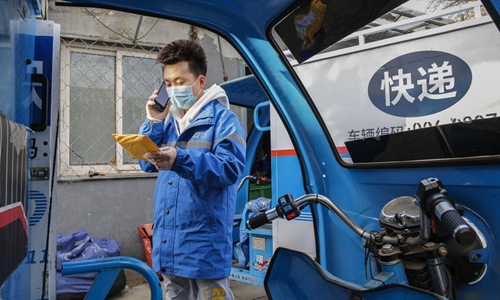HOME >> OPINION
US virus fight lacks China’s courier services
By Ding Gang Source:Global Times Published: 2020/3/25 18:23:40

A delivery man contacts a customer by mobile phone in Beijing, capital of China, March 12, 2020. Photo: Xinhua
Over the past two months, my family, like most others in China, has been locked down in our residential community. When the COVID-19 epidemic situation was at its most intense, only one member of a family was allowed to go outside for shopping, and only every other day.But life went on as usual, since most of our daily necessities could be purchased online and delivered to the entrance gate of our community. During the Spring Festival holidays in late January, we ordered takeout of some delicious dishes from a famous local restaurant.
Most Chinese cities and villages were locked down for more than a month due to the COVID-19, and China's network of express delivery ensured the stability of most Chinese households.
Express delivery is a key part of China's industrial and agricultural production supply chain, which ensures Chinese people's quality of life and helped them enjoy Spring Festival - the most important family reunion occasion for the Chinese.
As countries around the world are now facing the impact of the pandemic, many people are seeing the benefits of the Chinese government's large investment and strong enforcement ability. The role of China's express delivery companies in this country of 1.4 billion people was mostly unknown to the outside world until TIME magazine put a photo of a Chinese courier on the cover of its latest issue.
China's epidemic prevention has achieved good initial results because China concentrated its efforts on treatment and adopted strict measures including Wuhan's lockdown, but China could not have done it without the enormous contribution made by our couriers and express delivery companies.
Without them, it would have been impossible to ensure the supply of basic necessities needed by people living in quarantine in their own communities.
It is difficult for many countries to achieve strict quarantine. This is not only because there is no primary-level Party organization like there is in China, but also because they don't have enough express delivery services to ensure that people in quarantine have access to the basic household items.
In Europe and the US, there are plenty of groceries and toiletries on store shelves, but due to a lack of delivery services, people cannot stay home for extended periods. They have to go out to buy daily supplies, which has created window for the spread of COVID-19.
Under a worst-case scenario in the US, with stores remaining open and no social isolation, as many as 215 million Americans could be infected and 2.2 million could die from the virus, Bloomberg reported on Monday.
Express delivery is ubiquitous in China's urban and rural areas today. Seeing Chinese couriers riding on the roads, many people think of the vitality of the Chinese economy. Total revenue of China's express delivery industry reached 960 billion yuan ($136 billion) in 2019. Some 556,000 villages in China had direct mail services and 96.6 percent of Chinese villages and towns were covered by express delivery.
China's express delivery industry faces a problem of upgrade. Millions of young couriers have become an indispensable driving force for China's economy, but their social insurance should be integrated into the state's system, and they should be provided with all necessary insurance as other industrial workers are.
Chinese delivery drivers' income is relatively high and job requirements low, which has attracted a large number of young rural people to the industry. Yet many of them lack basic social insurance and job security. There is hardly a path to promotion or job mobility, and elderly people are not suited to the rigorous requirements of the job. How to turn these young members of the labor force into stable members of middle class is an issue for the economy, society and China's development. They have contributed to the Chinese economy and China's epidemic prevention, and they deserve something and anything better.
The author is a senior editor with People's Daily, and currently a senior fellow with the Chongyang Institute for Financial Studies at Renmin University of China. dinggang@globaltimes.com.cn. Follow him on Twitter @dinggangchina
RELATED ARTICLES: